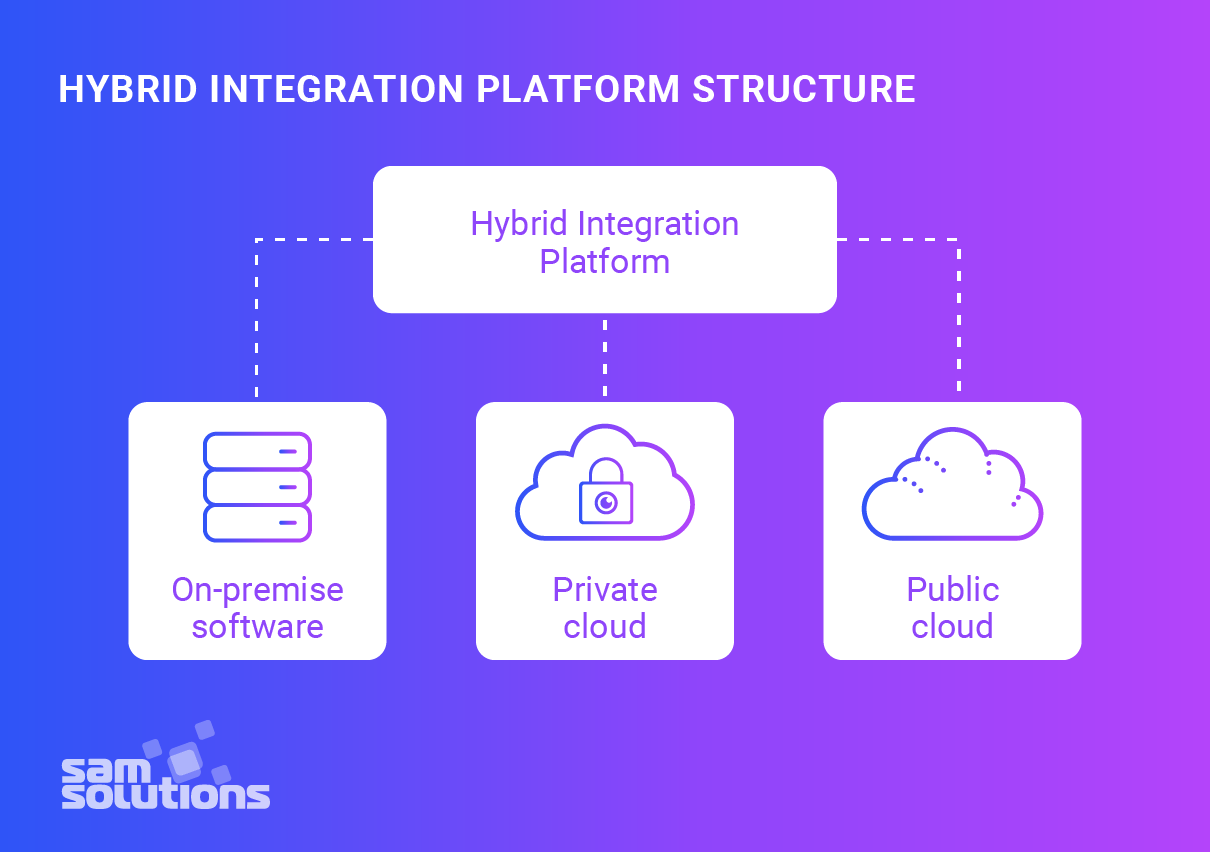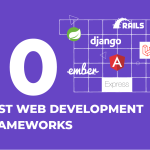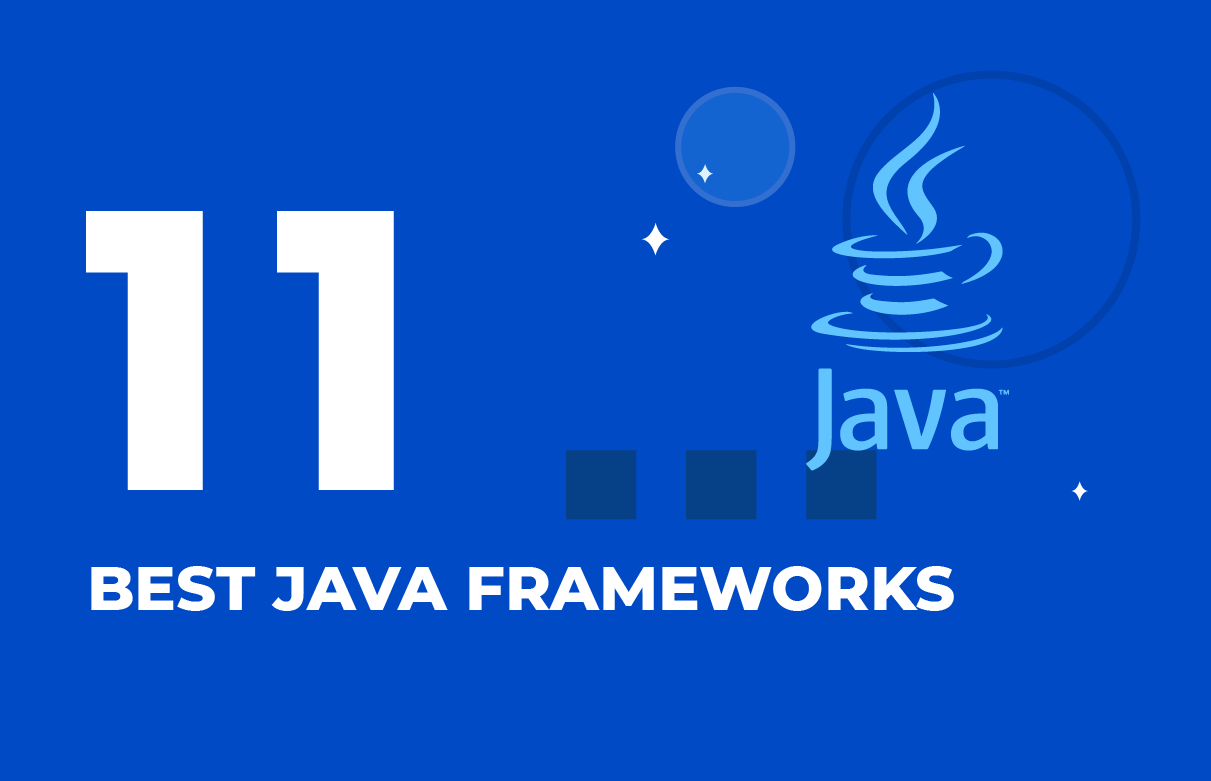The current IT landscape of most companies can be described by the word “hybrid,” meaning that business processes are managed by the aggregation of local, mobile and cloud applications. Diverse integration tools should make all of them work as a coherent system, providing interoperability, flexibility and seamless data sharing between numerous components. But using many tools is complicated. The most appropriate option now is a hybrid integration platform for enterprises. What is a hybrid integration platform? We will explain.
Drive your digital transformation to the next level with our world-class cloud development services
Why Is Integration Needed?
In the age of digital transformation, different emerging services (on-premises, cloud-based, IoT, etc.) result in a more heterogeneous IT architecture. All of these services offer business advantages, and a company can rarely choose only one direction, e.g. totally move to the cloud or retain a 100% local hardware. Decision-makers prefer to implement the best solutions from various technological sectors, integrate them and build a single production system.
Problems may arise when integration tools by different vendors are not compatible: company’s specialists must customize them, ensure their compatibility and eliminate other obstacles, all of which is time-consuming. Hence, the strategy of hybrid integration appeared.
Based on the study by Research and Markets, spending on hybrid integration platforms is expected to grow from $17.14 billion in 2017 to $33.6 billion in 2022, which is a CAGR of 14.4%.

Almost double the increase in spending for a five-year period is not surprising and quite realistic, as hybrid integration platforms are extremely beneficial for companies. They can:
- Reduce maintenance costs
- Provide rapid data sharing
- Eliminate odd functionality
- Leverage advantages of all systems (web-based, cloud-based, mobile, social networks, etc.)
What Is a Hybrid Integration Platform?
As the name implies, a hybrid integration platform (HIP) is a unification of various technologies into a single framework. Usually, companies integrate legacy infrastructure (servers, databases, warehouses) with cloud solutions (IaaS, PaaS, SaaS).
Such a strategy allows, on the one hand, to maintain sensitive data within an organization and, on the other hand, to take advantage of as many technologies as possible.

In a company with an implemented HIP, different departments can use solutions from different providers, remaining flexible and not interfering with each other. Thus, a hybrid integration platform is a control center that provides communication between various technology solutions and allows the company to meet changing client requirements without delay.
An HIP is a new round of development, as opposed to monolithic management structures. It integrates inner and outer services into a single environment, provides a secure gateway for transferring data, makes way for innovations and creates a competitive advantage.
Four Reasons Why You Need HIP
Hybrid integration provides the perfect balance for enterprises, leveraging advantages of local and cloud systems and allowing them to remain competitive. Described below are the main reasons why businesses should use hybrid platforms.
1. Single Control Center

The main purpose of the integration platform is to quickly connect all IT-systems, applications and software, regardless of what platforms they are on. This allows businesses to obtain and analyze data from different sources and manage it from a single center.
Such a practice provides seamless and quick data sharing, eliminates mistakes that may arise because the information is stored in separate databases, and synchronizes any new systems.
2. Integration of Everything with Everything

With hybrid integration technology, enterprises can greatly expand the number of services and products they offer. It is possible because they can integrate any device and software with any other system.
This can be both the integration of applications within an organization and outside connection with partners and vendors. An HIP configures, regulates and manages data sharing between employees, partners and customers, which allows for better communication, improves productivity and the level of satisfaction.
A hybrid integration strategy is particularly relevant for companies with numerous partners and branch offices, as they usually generate loads of files to share.
3. Quick Introduction of Innovations

The capabilities of the HIP can keep pace with the industry and market changes. Therefore, businesses can quickly adapt to emerging technologies, new rules and processes.
The introduction of innovations will not be a challenge anymore; it will turn to a smooth process with fewer risks and more opportunities.
4. Reduced Costs and Risks

After introducing HIPs, business owners experience cost reduction and fewer concerns regarding data safety. This happens due to the following factors:
- Reduced amount of hardware to buy and maintain
- No need to acquire multiple complicated integration tools
- Elimination of redundant or outdated systems
- Centralized risk management of shared data
- Taking advantages of all needed technologies
- AI-based data analysis and faster decision-making
If you are now convinced that implementing integration platforms is profitable, take a look at the world’s leading vendors and their offerings.
Microsoft Hybrid Integration Platform
Microsoft created one of the best cloud platforms in the market — Azure. The company did not pass on the hybrid integration sector, either. Azure hybrid integration platform is a perfect way to optimize your existing assets and build a connected enterprise.
Azure unifies SaaS services with local apps using:
- Logic Apps and BizTalk Server
- Out-of-the-box connectors (Dynamics CRM, Salesforce, Box, Office 365)
- Custom APIs
You can build powerful solutions and reach exceptional agility, high speed and lower costs. Microsoft also offers other services to improve your solutions, such as Machine Learning, Cognitive Services, Data Lake Analytics, IoT Hub and IoT Suite.
Read also: Migrating to Azure: Best Practices
IBM Hybrid Integration Platform
IBM offers to create an effective and agile multi-cloud architecture with IBM Cloud Integration. This solution handles any type of integration, connecting legacy systems with emerging technologies. You can simply build connections using drag-and-drop functionality and secure data in accordance with GDPR.
Personalized customer experiences, quick and secure data transfer across on-premises and multiple clouds, rapid reaction to market changes — these are just some of the benefits the IBM platform provides.
Oracle Hybrid Integration Platform
Another popular solution that simplifies the interconnection of cloud-based and on-premises systems is the Oracle Cloud Platform. It includes a set of products for app development, business analytics, data integration and management, enterprise integration, content and experience management and security enforcement.
The platform with its intuitive interface can suit both professional developers and users with little technical skills, allowing them to support various use cases. In other words, Oracle offers something for every situation.
We develop innovative cloud-based solutions for clients around the world
To Sum Up
The IT environment of modern enterprises has greatly expanded and includes a variety of services such as IoT solutions, mobile apps, SaaS platforms, social and internal networks, content management systems and more. In this case, the necessity of a hybrid integration model is undisputed. Currently, an HIP is the key component of doing business, as it is the most effective mechanism to link all of these services and build a single workable system.
SaM Solutions is an outsourcing company that provides both cloud-based services and on-premises software development and support. You can get further details via our contact form. Don’t hesitate to ask your questions!



























 5 Reasons Why Your Business Needs a Mobile eCommerce Application
5 Reasons Why Your Business Needs a Mobile eCommerce Application Using Salesforce to Improve Your Sales Pipeline: Five Tips
Using Salesforce to Improve Your Sales Pipeline: Five Tips Cross-Platform Mobile Development: Five Best Frameworks
Cross-Platform Mobile Development: Five Best Frameworks How to Develop Custom Accounting Software
How to Develop Custom Accounting Software 10 Best Web Development Frameworks in 2023
10 Best Web Development Frameworks in 2023












 Why React and Node.js Are the Top Technologies for Creating High-Performance Web Apps in 2024
Why React and Node.js Are the Top Technologies for Creating High-Performance Web Apps in 2024 10 Best IoT Platforms for 2024
10 Best IoT Platforms for 2024 Top 20 Latest Trends in the Ecommerce Industry in 2024
Top 20 Latest Trends in the Ecommerce Industry in 2024 Top 10 Most Popular Programming Languages in 2024
Top 10 Most Popular Programming Languages in 2024 Digital Transformation Strategy [+ Key Trends in 2024]
Digital Transformation Strategy [+ Key Trends in 2024]